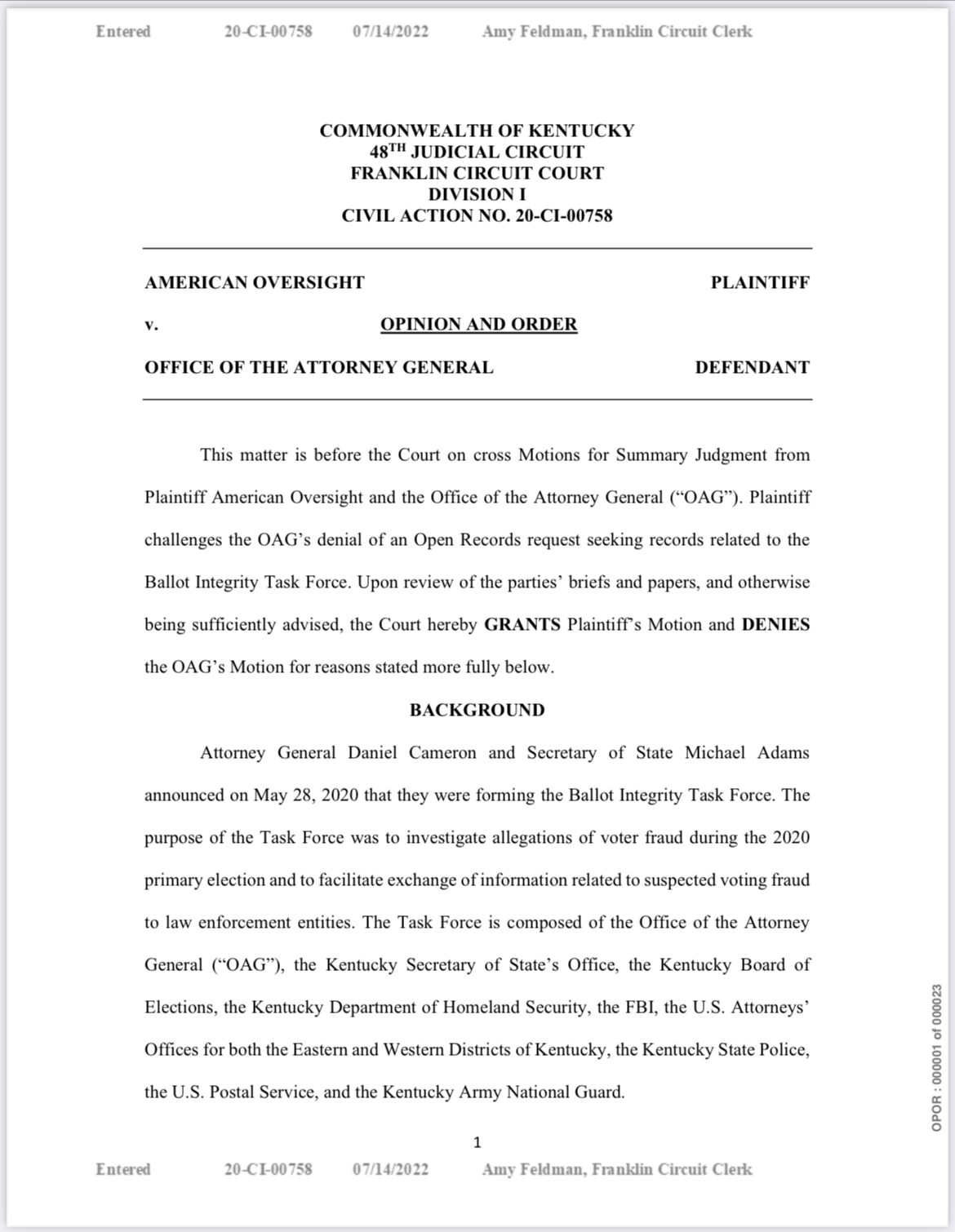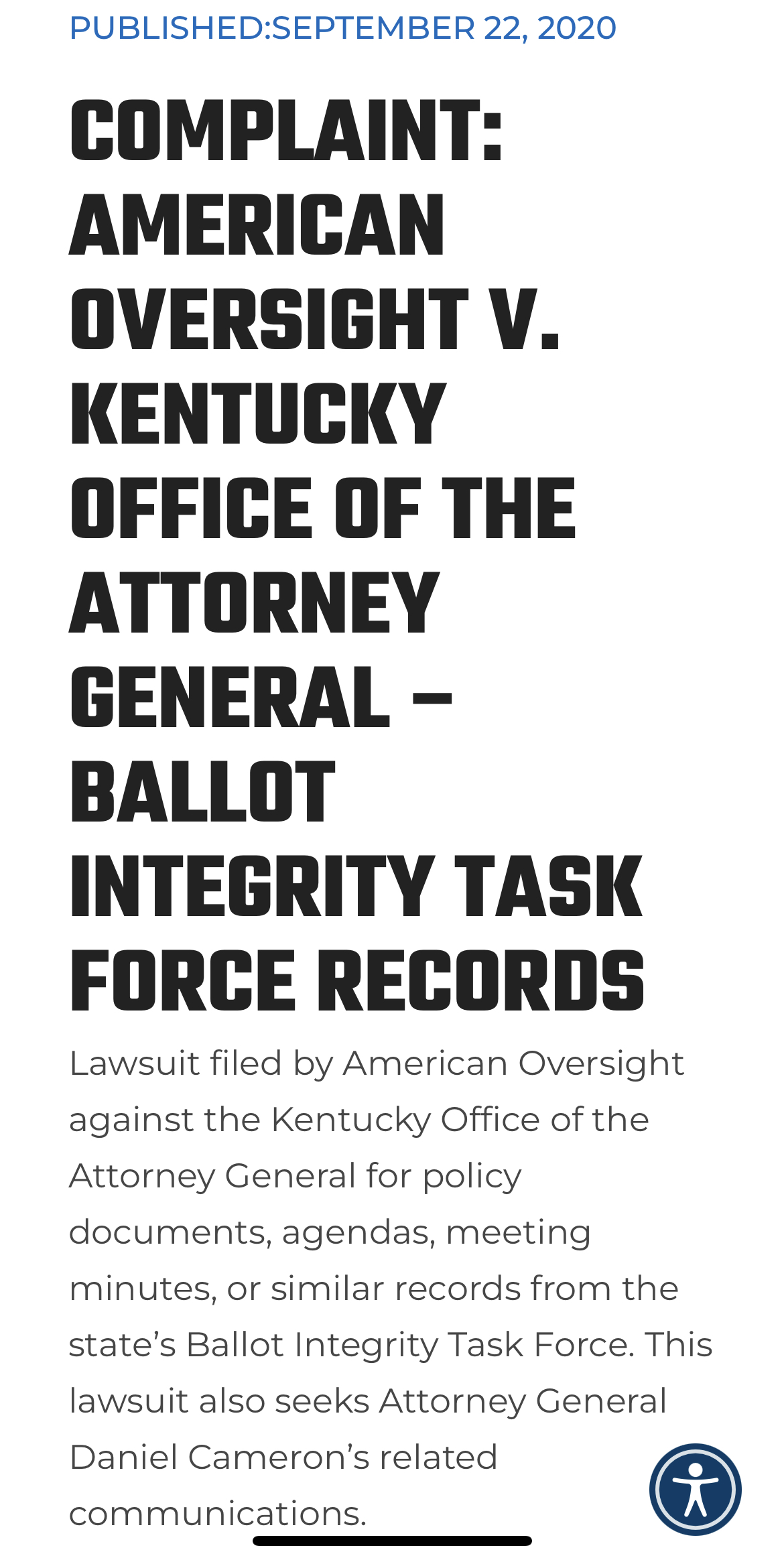

In January 2021, the Kentucky Open Government Coalition took note of a largely overlooked open records dispute involving Attorney General Daniel Cameron’s denial of American Oversight’s July 2020 request for records relating to the Kentucky Absentee Ballot Integrity Task Force.
https://www.facebook.com/419650175248377/posts/850574638822593/?d=n
American Oversight — “a non-partisan, nonprofit organization that seeks to promote government transparency and accountability” — requested records from the attorney general related to the activities of the task force, records related to its formation, and records related to the conduct of its business, including agendas and meeting minutes.
https://www.thetimestribune.com/news/officials-create-ballot-integrity-…
Cameron released a single meeting agenda. He acknowledged the existence of 13 additional responsive records but denied American Oversight access to these records. In support, Cameron cited the “permanent exception” for criminal litigation files of Commonwealth’s and County Attorneys found at KRS 61.878(1)(h) and the ever popular “preliminary documents” exceptions found at KRS 61.878(1)(i) and (j).
American Oversight requested review of the denial from the Office of the Attorney General, and the office affirmed its own denial.
https://ag.ky.gov/Resources/orom/2020/20-ORD-147.pdf
American Oversight subsequently appealed the Attorney General’s open records decision to the Franklin Circuit Court.
https://americanoversight.org/document/complaint-american-oversight-v-k…
In welcomed news, we learned that the Franklin Circuit Court decided the case in favor of American Oversight on July 14. It is, however, likely that the opinion will be appealed by the attorney general — as a “face saving” measure — notwithstanding the fact that, as an announced candidate for governor, he already has one foot out of the office door.
The importance of the court’s opinion in American Oversight v Office of the Attorney General cannot, however, be overstated.
This is true for three reasons.
1) The court repudiates the attorney general’s attempt to extend the “permanent exception”for Commonwealth’s and County Attorneys’ criminal litigation files —found at KRS 61.878(1)(h) — to non-criminal/non-litigation records and to re-write KRS 61.878(1)(h) to expand its protection to records of the attorney general. This means that the Attorney General cannot invoke the “prosecutors’ exception” in the “law enforcement exception” to permanently shield his criminal litigation files and no one can invoke it to deny access to non-criminal (as here) records.
2) The court repudiates the attorney general’s attempt to expand the scope of the preliminary documents exceptions — as construed in Courier Journal v Jones to justify nondisclosure of the governor’s daily appointment ledger — to the widely publicized task force’s meeting notices and agenda. This means the responsive meeting notices and agenda is •not• the functional equivalent of a daily appointment ledger and Daniel Cameron is emphatically •not• the governor (to whom Jones narrowly related).
https://casetext.com/case/courier-journal-v-jones
3) The court expressly rejects the adequacy of the attorney general’s search for responsive records, declaring
that open records requesters:
“cannot be expected to know all relevant search terms or places where the agency may file such records. To place that burden on the requestor is to invite the agency to hide relevant records that are obscurely labeled or stored in deep recesses of its bureaucratic records system. It is the duty of the agency to conduct and open, thorough, and good faith search of its records in response to an Open Records request.”
Well said.
The Coalition welcomes each of these three holdings — resounding victories for the public’s right to know — but the final holding in particular.
At long last, a Kentucky court has established the parameters of an adequate search for public records, placing the burden squarely on the shoulders of the public agency — where it belongs — and lifting it from the shoulders of the open records requester. The latter can no more exhaustively identify all possible search terms that will yield all electronically stored responsive records than s/he can identify the designation on the tab(s) of hard copy file(s) stored in old school filing cabinet(s) that will yield all responsive paper records.
The requester cannot be “expected to request blindly, yet with particularity, documents from a file that he had never seen.”
https://caselaw.findlaw.com/ky-supreme-court/1387319.html
Should this holding survive the almost inevitable appeal of the July 14 Franklin Circuit Court opinion, it will be the most enduring legacy of American Oversight v Office of the Attorney General.


